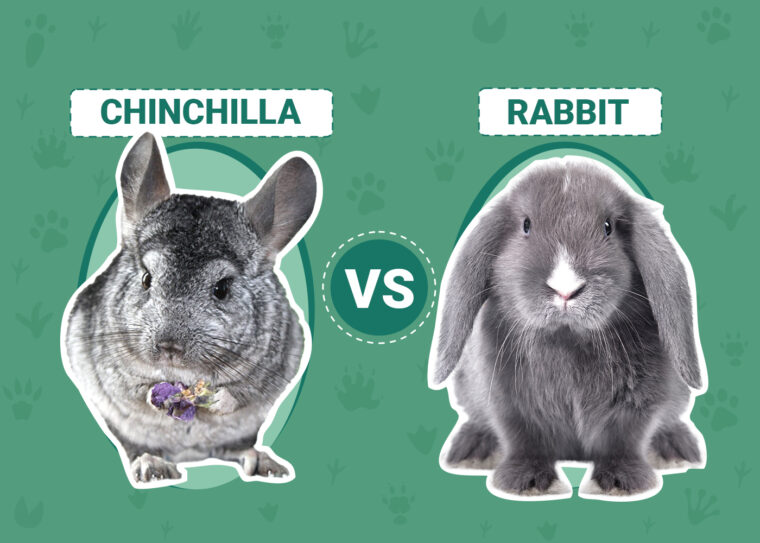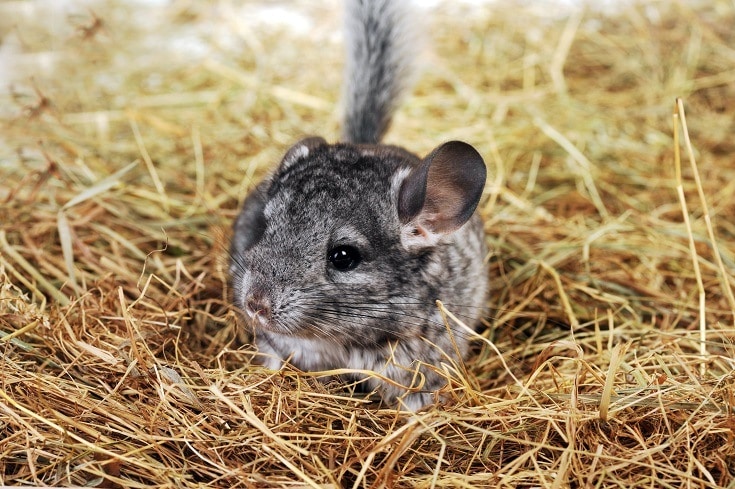
Click to Skip Ahead
If you want an adorable and cuddly family pet, but the thought of bringing a dog or cat home seems too basic to you, then chinchillas and rabbits are both excellent alternatives. These animals are cute and fluffy, and they’re relatively low-maintenance compared to many other popular pets.
However, while both make great pets, they’re not necessarily ideal for every household. If you’re trying to decide between the two animals, the guide below will walk you through all the things to consider before adopting one or the other.
We’ll look at everything from which one is more expensive to own to which one is easier to care for. After all, there’s no point bringing home either pet if they won’t fit into your existing budget or lifestyle.
Visual Differences

At a Glance
Chinchilla Overview

These tiny little animals are extremely cute and cuddly, and it won’t take long before you’re head over heels for one.
Unfortunately, though, many people find their appearance irresistible and adopt one without having the slightest clue how to care for them. That often leads to the animals being neglected or poorly cared for.
It’s important to educate yourself on everything that will be expected of you as an owner before adopting a chinchilla.
Personality / Character
Chinchillas are curious creatures, but they’re also naturally shy. It may take time before yours will warm up to you, but your odds of forming a tight bond are better if you adopt them when they’re still quite young, so they can acclimate to your presence.
They can be taught to enjoy being petted and other forms of affection, but chances are that they’ll never enjoy being picked up. They have delicate ribcages, so it’s best if you leave them on the ground. For that reason, they’re often poor pets for families with small kids.
It’s also important for you to realize that chinchillas are nocturnal. They can be extremely active late at night, and you should be prepared to lose a little shuteye if you’re a light sleeper. That also means that they may prefer to snooze during the day when you’d most like to play with them.
They also prefer to spend most of their time in their cages, so don’t expect to find yours wandering all over your house. They prefer shelter and security to wide-open spaces (which makes sense, given that so many animals see chinchillas as tasty snacks).

Health & Care
Caring for a chinchilla is very different than most other pets, and it’s not as simple or intuitive as you might expect.
They need a regular supply of both pellets and hay for food, and you should also give them something that they can gnaw on. Their teeth grow constantly, and they need to file them down, or else it could lead to serious health issues.
Chinchillas need a large habitat with plenty of vertical space. These animals are incredible jumpers, and you’ll need to give them plenty of room to do so. Keep the cage at a normal temperature as well (not higher than 80°F), and clean it at least once a week.
They’ll also need a dust bath two to three times per week. Leave the dust on for at least half an hour, then brush it off with a soft brush. This helps redistribute their natural oils and keep both their skin and fur soft.
Your new pet will also need plenty of toys to keep them occupied, as well as an exercise wheel to keep them healthy. You should also provide them with plenty of cardboard boxes, as they love to hide in them.
Suitable for:
Chinchillas can be excellent pets for anyone who wants a cuddly creature in the house but lacks the space or time for a cat or dog.
However, they’re not good for homes with children who aren’t old enough to handle them with care. These creatures are fragile, and they can easily be injured by an overexuberant child.
Rabbit Overview

Rabbits are more “traditional” pets and owning one is fairly common. As a result, you may be more familiar with how to care for one, but even so, it’s a good idea to do your homework before adopting one.
It’s also important to realize that there are many different types of rabbits, and they can all have needs specific to the breed. Rabbits can range from tiny little Netherland Dwarfs to massive Flemish Giants, and they won’t all be equally good fits for your lifestyle.
Personality / Character
Most people don’t realize it, but rabbits are actually intelligent creatures. They also have complex personalities and are true individuals, so if you own multiple bunnies, you’ll likely find that they all express themselves in different ways.
Many rabbits act similarly to cats and dogs in some ways. They’ll gladly sit in your lap and accept affection, and they often go wild when their owners come home after a long day. They also grind their teeth and purr when they’re exceptionally happy.
However, they have a dark side as well. They can be bratty and disobedient, and they’ve been known to be destructive and vengeful on occasion. It goes without saying, then, that you’re better off if you treat them well.
Unlike chinchillas, rabbits love to be set free from their cages, and they’ll happily explore your entire home — often at high speeds. As a result, you need to be absolutely certain that your home is bunny-proofed, and you shouldn’t have other pets that might view your rabbit as a meal on wheels.
They’re also more outgoing than chinchillas. This makes them better pets for families with kids, but you still need to supervise your children around them to make sure they aren’t mishandled. If you want a pet that will interact with you on a regular basis, a rabbit might be the better choice.
Health & Care
Rabbits are extremely active creatures. However, many people find that their pet rabbits do little more than sit in their cage and eat all day.
That’s not a good thing. If your rabbit isn’t active for at least a few hours a day, they’re likely depressed and possibly on their way to becoming overweight. They should spend at least 3 hours per day out of the cage; this should be enough to let them run around a bit and stretch out.

Many people choose to let their bunnies have free rein inside the house, eschewing a cage entirely. This is possible because rabbits are fairly easy to train to use litter boxes. If you choose to do this, though, it’s imperative that you make sure your house is safe for them and that there are no ways for them to escape.
However, if you want to keep yours penned up some of the time, you’ll need to invest in a large cage or bunny condo. The habitat should be kept in an area where they’ll be close to family members, as rabbits are social creatures, and it needs to be big enough that they can hop around without feeling constrained.
You’ll need to give your rabbit fresh hay every day, and this should make up the bulk of their diet. You can also give them veggies and fiber pellets, but they need the hay to help grind down their teeth. They’ll also need plenty of toys to keep them occupied.
Suitable for:
Rabbits are versatile pets, and they can fit in well with just about any household. However, keep in mind that many animals prey on bunnies, so if you already have a cat or dog, make sure the rabbit will never be left alone with them.
Rabbits are hardier than chinchillas and more outgoing, so they can handle homes with small children. They can also make a great starter pet for younger kids who aren’t ready for the responsibility of caring for a cat or dog. Just make sure to always supervise your kids with the rabbit to ensure that they’re treated well.
Which Pet Is Right for You?
Both rabbits and chinchillas can make great pets for the right household, as they’re easy to care for and wonderful to be around. However, they’re not equally suited for every home.
Chinchillas are more delicate creatures, and they tend to be more withdrawn as well. If you want a pet that you can lavish attention on, they may be a poor choice. On the other hand, they’re fairly easy to care for, making them a great pick for anyone who doesn’t want too much responsibility.
Rabbits are more outgoing, so if you’re looking for a more traditional pet ownership experience, they may be the choice for you. They’re loving and affectionate and often behave like cats or dogs. Like cats and dogs, though, they require a fair amount of interaction on a daily basis.
At the end of the day, you can’t go wrong with either pet. If you have small kids or want a deep connection with your new friend, though, a rabbit is likely the way to go.
See also:
- Bunny vs. Rabbit: Is There a Difference? Facts & FAQ
- Wild vs. Domestic Rabbits: Differences Explained (With Pictures)
Featured Image Credit: Top – webandi, Pixabay | Bottom – FiledIMAGE, Shutterstock










